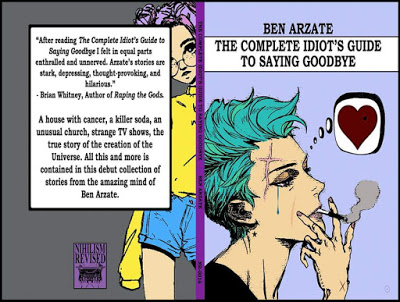When an obscure musician going by the name of “Y. Bhekhirst” released Hot in the Airport in 1986, perhaps he thought it might lead to fame and fortune. Indeed, though it may not have arrived in the form he expected, he has if nothing else, achieved a significant level of infamy from a moderately sized cult-like following of individuals, both amused and intrigued by his music. I suspect however, that he would not have predicted that the search to uncover his true identity would be the inspiration for a novel by Ben Arzate. The Story of the Y is that novel.
Maybe I’m low maintenance, but even just an earnest story about a researcher/reporter following a trail of clues through Mexico in a quest to solve the riddle of who “Y. Bhekhirst” really was would have been satisfying to me. The gritty and tedious work of going through files, questioning locals and piecing together evidence would have been interesting enough for me. As a hobby, I have been involved in the Zodiac killer research subculture for many years, so this sort of thing is right up my alley. For those of you who require something a little more tantanlizing, you’ll be relieved to know that Ben spices up the story with elements like brutal cartel violence and various supernatural phenomena. The basic gist of the plot is that an aspiring young reporter travels to Mexico with some friends (one of whom happens to be a ghost in a record) to locate and interview Y. Bhekhirst. I won’t spoil much of the rest for you, but let’s just say that when they arrive there, all hell breaks loose. The story had a somewhat Tarantino-esque feel to it, in that a group of characters starts off on a rather mundane quest and suddenly find themselves in a world of gruesome violence, torture and other freaky shit (along the lines as films like From Dusk Till Dawn.)
Ben Arzate has a very unpretentious writing style. He seems to have no use for the elaborately poetic, John Updike style prose when contextualizing scenes and describing settings. He narrates scenes in a very “matter of fact” way. I noticed this before when reading his book of short stories, The Complete Idiot’s Guide to Saying Goodbye, but could not tell at the time if this was characteristic of his actual style or a gimmick which was unique to that particular collection. This deadpan, no-nonsense approach makes for a breezy read and keeps the action easy to understand at all times. Ben is also very consistent throughout the book. It has a very cohesive and slightly polished feel, unlike so many indie “novels” which convey interesting ideas but are haphazardly thrown together. The Story of the Y is just the right length. Many budding young writers for some reason feel compelled to write 400 page epics their first time out, but Arzate keeps this thing short and punchy. You could probably read the whole thing in just a couple of hours. I actually read it in the bathtub over the course of maybe 6 or 7, thirty minute hot baths (and managed to do so without significantly ruining the pages of the book.) One last thing I must note (SPOILER ALERT) is that Ben wisely avoids “selling out” on the ending, keeping things ambiguous in a way which will prevent the book from potentially seeming painfully dated at some point in the distant future. I don’t really have a final “verdict” on The Story of the Y. It just isn’t that sort of book. It’s a well written, low-key adventure novel that’s entertaining, intriguing and doesn’t take itself too seriously.
For his part, Ben has been slowly transforming from a prolific reviewer into a prolific writer of his own original (and growing) body of work. If he keeps cranking out material at this pace, I guarantee that everyone will be hearing a lot more about this guy.



